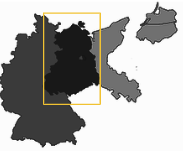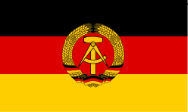Photo AI
Last Updated Sep 26, 2025
The GDR in 1949 Simplified Revision Notes for A-Level Edexcel History
Revision notes with simplified explanations to understand The GDR in 1949 quickly and effectively.
266+ students studying
The GDR in 1949
Following the unification of the Communist Party of Germany and part of the Social Democratic Party as the Socialist Unity Party of Germany or SED (1946), the GDR was created on 7 October 1949. It was followed by the election of the East German parliament or Volkskammer and Wilhelm Pieck as the first and only president of the GDR. Characterised as a socialist republic, the GDR's government was based on the Soviet Union model.

East Germany based on the Potsdam Conference
The highest state organ in East Germany was the Volkskammer (People's Chamber). Initially, it was the lower house of a bicameral legislature as created in 1949. The upper house was the Chamber of States or Länderkammer dissolved in 1958, following the abolition of states in 1952.
Under the National Front, the SED controlled the following political parties: Christian Democratic Union, Democratic Farmers' Party of Germany, Liberal Democratic Party of Germany and the National Democratic Party of Germany.
As mentioned, Ulbricht, General Secretary of the SED, held most of the executive authority in East Germany. At first, he was able to dominate the SED. His second goal was to remodel the GDR into a Stalinist state. Following the death of Stalin, Ulbricht transformed the SED into a 'party of the new type'. In February 1950, the creation of the Ministry of State Security or the Stasi was approved by the Volkskammer. Similar to the Nazi regime, the SED used intimidation and purging of all political opposition. Before the end of 1950, card-carrying members who were identified as capitalists, peasant farmers, bureaucrats and intelligentsias were removed from the party.

Flag of the GDR (1959-1990)
Similar to Soviet intelligence agencies, East Germany had the Stasi and the Ministry of State Security.
In 1950, the Volkskammer passed resolutions lowering parental supervision to 18 years old and freedom of religion.
The following year, emigration of East Germans to the West increased to 17,000 per month. By 1953, it rose to 37,000 East Germans per month.
In 1954, the Soviet Control Commission in Berlin was disbanded, East Germany was declared independent.
500K+ Students Use These Powerful Tools to Master The GDR in 1949 For their A-Level Exams.
Enhance your understanding with flashcards, quizzes, and exams—designed to help you grasp key concepts, reinforce learning, and master any topic with confidence!
440 flashcards
Flashcards on The GDR in 1949
Revise key concepts with interactive flashcards.
Try History Flashcards32 quizzes
Quizzes on The GDR in 1949
Test your knowledge with fun and engaging quizzes.
Try History Quizzes29 questions
Exam questions on The GDR in 1949
Boost your confidence with real exam questions.
Try History Questions27 exams created
Exam Builder on The GDR in 1949
Create custom exams across topics for better practice!
Try History exam builder120 papers
Past Papers on The GDR in 1949
Practice past papers to reinforce exam experience.
Try History Past PapersOther Revision Notes related to The GDR in 1949 you should explore
Discover More Revision Notes Related to The GDR in 1949 to Deepen Your Understanding and Improve Your Mastery
96%
114 rated
Divided GermanyThe Federal Republic the DDR1949-63
The creation of West Germany and the DDR
401+ studying
181KViews96%
114 rated
Divided GermanyThe Federal Republic the DDR1949-63
The Basic Law of West Germany
458+ studying
184KViews96%
114 rated
Divided GermanyThe Federal Republic the DDR1949-63
The 1949 election; the economic miracle
331+ studying
194KViews96%
114 rated
Divided GermanyThe Federal Republic the DDR1949-63
FRG elections of 1953, 1957 and 1961
248+ studying
188KViews